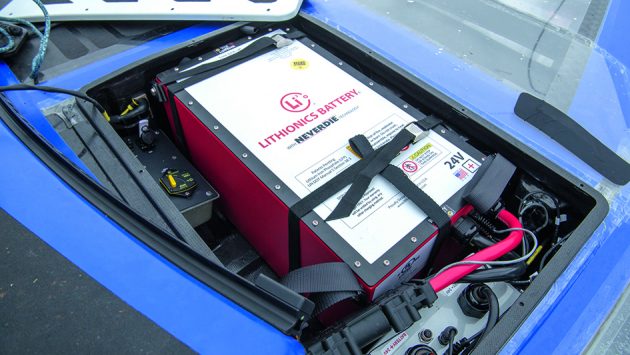Boat owners who plan to install their own lithium batteries onboard are being advised to seek professional help or risk invalidating their insurance
Boat owners wanting to upgrade to a lithium-ion battery onboard are being warned to seek professional help rather than do the work themselves or face problems securing insurance for their vessels.
Boat insurance companies have raised concerns over the risk of lithium-ion batteries failing and bursting into flames due to their flammability and sensitivity to high temperatures.
A number of fires involving boats and electric vehicles are alleged to have been caused by lithium battery failure.
In 2018, the 40m motor yacht Kanga sank in Croatia after a fire onboard which was believed to have been caused by faulty lithium-ion battery packs on electric surfboards.
As they have become cheaper, the use of lithium-ion batteries has risen in the sailing sector, as owners find ways to cut fuel costs and exhaust emissions.

Lithium batteries are much lighter than traditional lead acid batteries. Credit: Theo Stocker
According to the Maritime and Coastguard Agency’s Marine Guidance Notice 550, which provides guidance on the safe design, installation and operation of lithium-ion batteries, an increase in cell temperature due to damage or short-circuiting is the most significant risk when using lithium-ion batteries, which can lead to a thermal runaway.
‘A key hazard of lithium-ion technology is the way a minor lithium-ion cell defect can quickly cascade into a full battery fire incident,‘ it said.
Some insurance brokers are now refusing to insure boats with lithium-ion batteries on board or have put caveats in place for their use.
Haven Knox-Johnston says it has ‘no issues’ with lithium batteries as long as they are not used as a replacement for the main engine.
Continues below…
What does boat insurance cover?
What does boat insurance cover and why do boat owners need it? Mike Taylor reveals what lies behind this outlay
How lithium batteries are changing onboard power
Duncan Kent investigates the technology used in lithium batteries and explains what to consider in matching them with a management…
How to choose the right lithium batteries for your boat
Boost the life and performance of your lithium battery by installing the correct charging setup, says Duncan Kent
Lithium-ion batteries: a buyers’ guide for sailors
Duncan Kent explains why you should opt for quality when installing a lithium-ion battery, plus our pick of the best…
‘Because of the number of claims which may or may not have been caused as a result of lithium battery fires, our underwriters are happy to accept lithium batteries as long as it is not the primary source of the vessel’s propulsion. They have confirmed that we have not yet had an issue with lithium batteries but with so much in the press about it, we are simply minimising the risk,’ said a spokesman for the broker.
Pantaenius UK managing director Mike Wimbridge says the firm doesn’t have ‘an anti-lithium policy’, but boat owners should inform their insurance company if they change anything fundamental on the boat as it may affect their policy.

Do not leave items which use lithium-ion batteries charging on board when you leave the boat. Credit: Getty
He said DIY lithium-ion battery installations by unqualified boat owners were ‘a concern’, and all systems should be installed by a professional.
Wimbridge also warned about leaving electrical items charging onboard or leaving anything which uses lithium batteries plugged in when the boat was empty.
‘If you have items powered by lithium batteries, whatever type they are, you just need to be aware and follow some good old housekeeping rules, like don’t leave things charging when you’re not on board, don’t leave them in direct sunlight, and make sure you buy from reputable sources,’ he explained.

To keep your batteries in good condition, make sure you regularly top them up. Lithium Iron Phosphate (LiFePO4) or LFP batteries like to be charged to 90% most of the time
YM expert Duncan Kent, who has researched lithium-ion batteries, said there are many different types, some of which are inherently dangerous if misused or incorrectly installed.
He said lithium-iron-phosphate (LiFePO4) cells are considered much safer than lithium-cobalt cells often found in electric vehicles, as tests by fire authorities have found they are ‘almost impossible to set fire to’, even when drilled through or shorted out.
‘My advice is, if you’re planning to upgrade to a Li-ion battery bank, ignore the ‘drop in replacement’ sales promises and at least get some advice from a professional marine electrician who knows all about Lithium-ion cells and their specific charging requirements. Better still, get them to design the system for you. That way you can inform your insurance company that it is a professionally designed power system, which hopefully should ease their minds,’ he added.
Pick up a copy of Sail the British Isles book from Yachting Monthly

From the makers of Yachting Monthly comes this essential guide to sailing around the UK and Ireland. Every iconic location in the British Isles is covered here, from peaceful ports like Dartmouth to sailing hotspots such as the Isle Of Wight. Perfect for planning a long weekend getaway or an ambitious break on the waves, Sail The British Isles is perfect for any boating enthusiast who is itching to discover their next adventure.
Follow us on Facebook, Twitter and Instagram.








